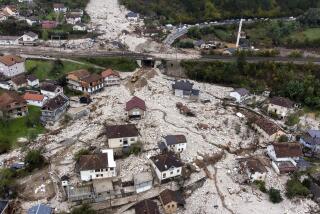Armies Pull Back from Bosia Front Lines : Balkans: But as peace slowly takes hold, fearful Serbs begin digging up their dead relatives and preparing to flee.
SARAJEVO, Bosnia-Herzegovina â Rival armies pulled back peacefully from some of Bosniaâs front lines Friday, but there was fear in Sarajevo: Some Serbs who refuse to be ruled by Muslims dug up their dead and fled the city.
The United Nations said it wouldnât help move coffins, calling it a âbizarre ritual.â In officially declaring an end Friday to the state of war, Bosnian President Alija Izetbegovicâs government urged residents of Serbian-held suburbs of Sarajevo to stay.
But some Serbs are terrified of what will happen when the city and its suburbs pass into the hands of a Muslim-Croat federation.
âI have to remove his remains to prevent the Muslim-Croat coalition from desecrating them,â said Jadranko Milinic, a Serbian soldier who was removing the coffin of a cousin killed in fighting in 1993.
âIf he stays here, Alija will plow him over,â he said, referring to the countryâs Muslim president.
The Serbsâ fears underlined the deep distrust that remains in Bosnia despite the U.S.-brokered peace agreement.
Under the accord signed in Paris Dec. 14 by all warring sides, Bosnia was divided in two--one part Serb and the other ruled by a federation of Muslims and Croats. Sarajevo and its suburbs will be part of the Muslim-Croat half of Bosnia.
There were few reported tensions outside of Serbian-held sections of Sarajevo, however.
Serbs, Croats and Muslims cooperated with NATO efforts to demolish the rival armiesâ checkpoints on the third day of âOperation Joint Endeavorâ--NATOâs mission of policing Bosniaâs peace. Under the accord, the rival sides must withdraw 1.2 miles from confrontation lines within 30 days.
The successful separation of forces is key to implementing the most important parts of the peace deal: rebuilding the war-ravaged country and holding elections to set up democratic institutions.
In Ilidza, a Serb-held Sarajevo suburb, dozens of families packed their belongings and relativesâ remains onto tractors and trucks and apparently headed for Serbian territory outside Sarajevo.
An old man who did not want to be identified explained why he was exhuming his son: âI want to be able to visit his grave and light a candle.â
Bosnian Serb leaders are holding out for changes in the peace plan, hoping for some autonomy for Sarajevo Serbs, a postponement of Sarajevoâs reunification, or other concessions.
Swedish diplomat Carl Bildt, who is in charge of civilian implementation of the peace, met with Serbian leaders at their stronghold of Pale, outside Sarajevo.
âThe most difficult thing to understand is that those who were enemies yesterday are going to be partners tomorrow,â Bildt said.
Serbian authorities have been trying to prevent people from leaving, and Bosnian leaders promised Friday to safeguard the safety and freedom of all in Sarajevo. But thousands have fled.
NATO troops have met no resistance in clearing front-line checkpoints, and local military commanders also said matters were going smoothly.
SRNA, the Bosnian Serb news agency, also confirmed some withdrawals.
It said a French Parachute battalion took over some rebel Serb defense lines in Grbavica, a southern Sarajevo suburb. âThis marks the beginning of the separation of the two entities,â said the agency.
In a substantial sign of easing tensions, Franjo Komarica, the Croat Roman Catholic bishop in Serbian-controlled Banja Luka, was released from 231 days of house arrest. He was detained as part of Serbian attempts to push out Croats and Muslims from their regions.
âThe time of destruction and expulsion is, thank God, over,â the Catholic news agency IKA quoted Komarica as saying.
About one-third of the 60,000 NATO-led troops that are to enforce the peace deal are already in Bosnia, said Lt. Marky Rayner, a NATO spokesman in Sarajevo.
More to Read
Sign up for Essential California
The most important California stories and recommendations in your inbox every morning.
You may occasionally receive promotional content from the Los Angeles Times.










